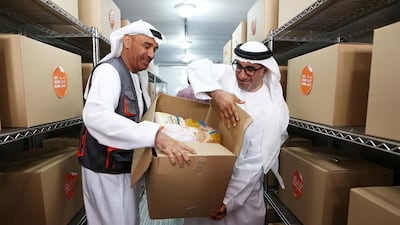DUBAI // Low-income families and labourers will be able to get food donated by hotels and supermarkets after the country’s first food bank was launched in the city on Wednesday.
Stocked with boxes of food as part of the Year of Giving, the food bank aims to help provide for the less fortunate while reducing food waste.
Sheikh Mohammed bin Rashid, Vice President and Ruler of Dubai, launched plans for the UAE Food Bank in January.
“The UAE Food Bank represents one of the most humanitarian values in the UAE, and is well on its way to becoming one of the country’s largest humanitarian institutions, widely spreading the culture of giving within a sustainable institutional framework,” said Sheikha Hind bint Maktoum Al Maktoum, chairwoman of the UAE Food Bank Board of trustees.
So far, 96 hotels, 240 food shops and 7 charitable organisations across the country have answered Sheikh Mohammed’s call to action and signed up to donate their excess food and help with its distribution.
On Wednesday, 30 of these partners – including Atlantis The Palm, Choithrams, Jumeirah Group, Armani Hotel, Aswaaq supermarkets, Starwood/Marriott and Al Rawabi Dairy – attended a signing ceremony with Dubai Municipality and the Mohammed bin Rashid Al Maktoum Global Initiatives foundation, which runs the programme.
“It is a fantastic initiative to be associated with,” said Colette Shannon, spokeswoman for Spinneys, which took part in the programme’s trial run this year by donating fresh bread and other food from its supermarket in Umm Suqeim. “Being able to manage the distribution back out to those who need it most is hugely important.”
The municipality developed a UAE Food Bank app to manage the logistics for each donation. Donors can log on to the app and list the daily products they have for collection. A transport company authorised by the municipality can collect the produce and deliver it to the food bank.
Then one of the partner charities can claim the goods through the app and redistribute the food, with each donation traceable online by all partners.
Some items, such as excess food from banquets, weddings or conferences, will be transported within 24 hours or less.
Hussain Nasser Lootah, director general of Dubai Municipality and deputy chairman and managing director of the UAE Food Bank, said plans were under way to launch many more food bank outlets soon.
“We are planning to build about 30 places similar to this food bank across the UAE,” said Mr Lootah. “We want to minimise the amount of food being wasted, and we want also to give support for the needy people throughout the UAE.”
The first UAE Food Bank is just off D67, west of Al Khail Road in Al Quoz, and is close to many labour camps. It includes two large shipping containers that have been converted into refrigerated storage units lined with shelves stocked with boxes of dry foodstuffs.
Mr Lootah said community refrigerators filled with fresh sandwiches, juice and water are also to be being distributed as part of the initiative.
“They will be distributed beside the mosques and some parks,” he said. “People who have extra food, who follow the hygienic instructions from Dubai Municipality, can come and store it here so that people who need food can take it.”
Ahmed Al Muhairi, executive director of the charity work sector of the Islamic Affairs and Charitable Activities Department in Dubai, said the initiative is different to food banks in many western countries, where the less fortunate are typically invited to choose free food from the shelves. In Dubai, the food will be distributed to the economically disadvantaged by charities and volunteers. The UAE Food Bank, for the most part, will inspect, store the goods and facilitate logistics.
“Here, it is different,” Mr Al Muhairi said. “Here we need to make sure that we take what would otherwise be discarded, but good food, and give it to those who need it. It is as much about reducing waste as it is about fulfilling a basic human need.”
The UAE loses Dh13 billion each year in food waste, according to the Dubai Media Office.
rpennington@thenational.ae

